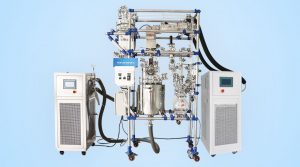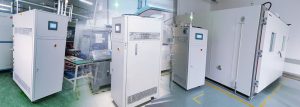Why do chemical raw materials require low-temperature chillers?

The main reasons for using low-temperature chillers in the production process of chemical raw materials are as follows:
Control de temperatura: Many chemical reactions are temperature sensitive and require precise temperature control to ensure reaction rate, selectivity, and product purity. Low temperature chillers can provide stable low temperature conditions to help maintain the temperature inside reaction vessels, crystallization tanks, or other equipment within a specific range, ensuring that chemical reactions proceed as expected.
Thermal management: Chemical reactions are often accompanied by a large amount of heat release, especially in exothermic reactions. If there is no effective cooling, the reaction system may overheat, leading to side reactions, catalyst deactivation, decreased product quality, and even safety accidents. The low-temperature chiller unit can promptly remove excess heat and maintain a stable reaction environment.
Crystallization optimization: In the crystallization process of chemical raw materials, low temperature helps to form purer and more uniform crystals. The chiller unit can optimize crystallization conditions, improve product purity and yield by precisely regulating temperature.
Material cooling and stability: Some chemical raw materials are prone to decomposition, deterioration, or polymerization at high temperatures. Low temperature chillers can cool the materials to ensure their stable properties and facilitate storage and transportation.
Equipment protection: High temperature operations may damage production equipment, such as sealing failure, pipeline expansion and deformation. The use of chillers can effectively protect equipment and extend its service life.
Safety production: Low temperature control can reduce the risk of accidents when dealing with flammable, explosive, or toxic chemicals, such as reducing the emission of volatile organic compounds (VOCs) to ensure production safety.
In summary, low-temperature chillers play a crucial role in the production of chemical raw materials, not only related to production efficiency and product quality, but also an important means of achieving safety production and environmental protection.
Recomendaciones relacionadas
-
Adding VOCs gas condensate recovery unit market investment to create green power in the industry
1691In recent years, due to the deteriorating atmospheric environment and various environmental problems, people are paying more and more attention to the emission of volatile organic gases in the atmosphere. Volatile organic compounds, also known as ...
Ver detalles -
Closed cycle heating system temperature deviation description
1553If the temperature deviation occurs in the closed cycle heating system during use, it is necessary to check to see if there is any problem in each link, and solve the problem in time. In the steady state, the closed loop heating system displays th...
Ver detalles -
How to choose the optimal chiller solution?
1513Choosing a water chiller is like finding a "target" for an enterprise's production equipment. It must not only be "like-minded", but also "be well-matched". The one that suits you is the best. If the choice is not good, either the cooling effect ...
Ver detalles -
Enfriadora de agua serie KRY para pruebas de calidad de vehículos de nueva energía
1612The new energy vehicle powertrain test bench can be directly connected to the power output end of the electric drive assembly through the half-shaft. The front end is equipped with high-precision torque sensor and speed sensor to provide high-pre...
Ver detalles
 LNEYA Enfriadoras industriales Fabricante Proveedor
LNEYA Enfriadoras industriales Fabricante Proveedor













